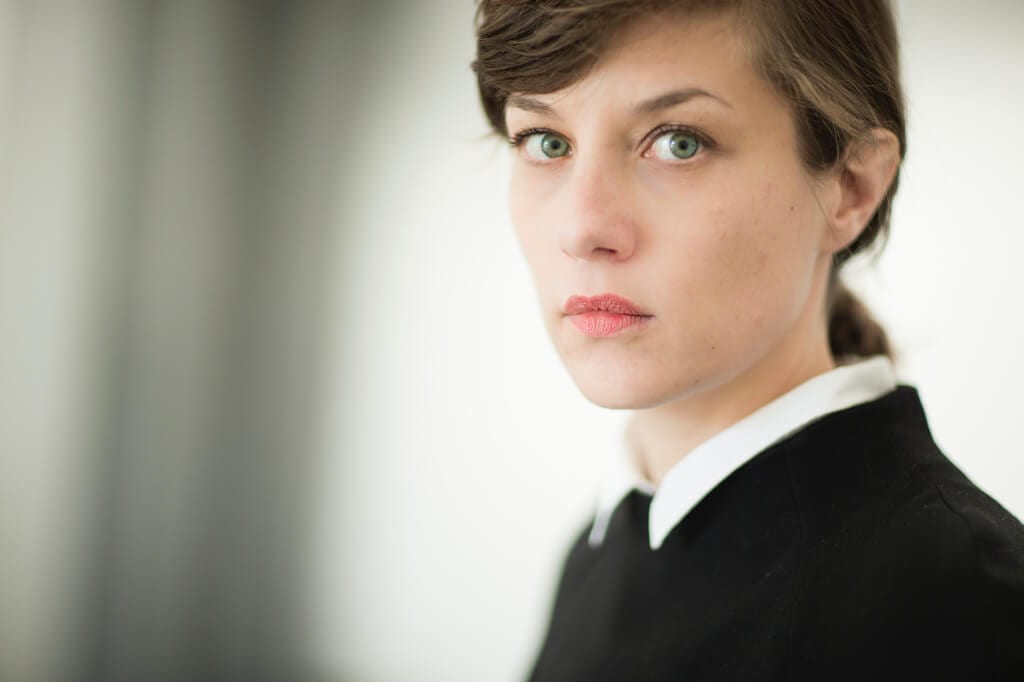(A summary of Q&A held with the Theatertreffen 20 visitors)
Susanne Kennedy is a leading figure in European theatre. Still young at just thirty-seven years old, Kennedy received a great deal of critical acclaim a series of productions in the Netherlands. In 2014 Kennedy premiered her adaptation of Rainer Werner Fassbinder’s 1970 film Why does Herr R. Run Amok? at the Munich Kammerspiele theatre. This production was subsequently selected for Berlin’s Theatertreffen the following year. Kennedy spoke to a room of journalists after her production was showcased at the festival earlier this year.
Munich is of course very special and has strong connections with Fassbinder. I wanted to explore the city’s mentality, so adapting Fassbinder was a logical decision.
Why does Herr. R Run Amok? is a strange film in some ways. It was filmed over the space of three days and the actors completely improvised. They were placed in certain scenes, an office for example, and given free rein to discuss things. Gradually they grew used to the camera’s presence and their improvised dialogue was transcribed. So, the film’s script did not exist until improvisation. Therefore the script is very different to those generally found in films or the theatre. Sentences are not fully formed and the characters do not consistently offer profound statements. Instead the characters bla bla bla away like people do in everyday speech, which is far more natural. It was very exciting to focus on this kind of language rather than be dictated by a playwright who insists on certain forms and ways of portraying the script.
Film as a medium achieves a certain sense of realism, which I wanted to replicate in the theatre. To attempt to achieve this we recorded countless people- friends, family, those who worked in the office of the theatre and passersby in the street reading arts of the script out of context. Our sound designer edited everything together and created a new composition of voices. The job for the actors was to climb into the bodies of these voices and work from there.
In the play we used masks to show how the characters aged. I work very closely with the costume department and we made masks for each of the performers. It’s a very old theatre tool, an essential theatre tool which dates back to Ancient Greek cultures. Other cultures explored it too, of course. I think something happens is possible with masks that you can sort of project your own theatres and ideas into this sort of very open screen in a way it is that makes it very possible to maybe feel with this person so it’s actually you yourself you take into your face in a way. And then you have the eyes, eyes and hands become very important with masks, so you have this thing and details suddenly become very fascinating and when they the actors look at you through the mask I think always this can be very strong because there’s such a focus on the eyes and looking from behind this screen for me is very fascinating. I would like to develop the use of masks and see where it can take me.
The play itself is about real life. There is no dramatic crescendo for the murder scene because the murder is not different. Maybe ‘running amok’ is not different to going to the office or drinking your coffee in the morning.
I am fascinated by the relationship between the stage and the ‘real world’. I want to create a way of mimicking, reflecting the real world from a certain distance, a detachment. An inspiration for me is to look at video games or Second Life, or things like that. Actually, it’s posing this question of what does being human mean; where does something stop being human and where does it start; what does having a free will mean; what are all these assumptions we have about an individual and its language, movement and control of its own body; what are these assumptions?
In German theatre, we very much work from a humanistic point of view and believe in individuality. When I talk it’s my own free will speaking. It’s a very Western idea. What I say is what I mean, and I have control over my own words. I have a lot of questions about that. When working with the actors I pose these questions, not that I have answers to them. It’s about going back to the point of zero and asking what does being human actually consist of?

